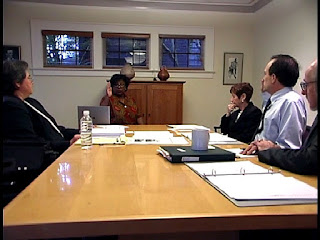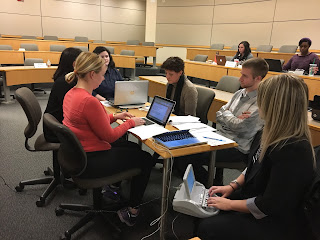This month, the King County
Bar Association Bar Bulletin published Thomas
M. O’Toole’s excellent recommendations on how to prepare a deponent. Mr.
O’Toole is the President of Sound Jury Consulting, and his following advice is
well worth reading and heeding:
The deposition performance of a key witness is
critical to the outcome of any case. Summary judgment motions are often won or
lost on the testimony of central witnesses. Even when the case survives summary
judgment, unfortunate behavior or answers in depositions can have a detrimental
impact at trial, leading jurors to dislike or distrust the witness, which
lowers their motivation to want to find in favor of the party that witness represents.
I often receive calls from attorneys who are looking for
a witness preparation session just before trial for a difficult witness. The typical explanation is that the witness
performed poorly in his or her deposition and needs to improve for trial. These
calls are frustrating because, while I am happy to help, there is no need for a
witness to perform poorly in a deposition. There are a variety of strategies
attorneys can use to position a key witness for success in his or her
deposition. Unfortunately, these strategies are often not used and attorneys
instead rely on deposition preparation sessions with witnesses that create more
problems than they do solutions.
The purpose of this article is to discuss the right and
wrong ways to prepare a witness for a deposition. All key witnesses should go
through this process. Attorneys should avoid making an assumption that a
witness will perform well in a deposition because he or she is smart, sociable,
or a good communicator. The trenches of daily life vary greatly from the
trenches of a deposition. Skill sets that make a person successful in daily
life do not necessarily translate to or prepare a witness for a deposition.
There is no greater example of this than former President Bill Clinton. Clinton’s
defining trait was his communication skills. He was a smart, charismatic man
who was known for his ability to adapt to just about any situation and
demonstrate excellent communication skills in the process. When he was deposed
in the Paula Jones sexual harassment lawsuit, most expected a solid
performance. The American Spectator described Clinton as the kind of witness
“who would strike fear into the hearts of opposing lawyers.” However, his performance was anything but.
The American Spectator went on to describe him as “an unsophisticated witness,
revealing a desire to please the opposing lawyer, and telling prepared stories
that suggested he had lots to hide.”
In order to understand the right ways to prepare a
witness for a deposition, let’s start by looking at the wrong ways to prepare a
witness. The typical preparation session between a witness and an attorney
involves both of them sitting down in a conference room for a few hours or more
and talking through the case. The attorney probes the witness on issues the
attorney needs to know more about and gives the witness all sorts of advice on
how to talk about different issues in the case. The session usually ends with a
homework assignment for the witness requiring him or her to review a bunch of
documents and try to remember an unreasonable amount of items.
There are several reasons this approach fails. First, the
witness will not remember the majority of what he or she was told. All of the
studies on recollection suggest the witness will remember about 10-20% of what
he or she was told in that session. Second, the witness is not given the
opportunity to practice the testimony, which is critical. Witnesses need the
experience dealing with all of the standard attorney tricks. They learn this
through actual practice. Third, all of the tips and advice from the attorney can
be overwhelming. Depositions are intimidating enough and now the attorney has
piled on all sorts of “important” things the witness “must” remember. In short,
this cramming approach does not work and can often backfire. Witnesses perform
poorly when they feel overwhelmed and not in control.
The difference between an ineffective and an effective
prep session is what I would describe as an “attorney-centered” approach versus
a “witness-centered” approach. The former focuses on the attorney’s needs while
the latter focuses on the witness’s needs. The fundamental goal of any prep
session should be giving the witness comfort and confidence, which are
essential to a successful performance. Everything else derives from these two
items. I often joke that witness prep sessions are actually therapy sessions.
In this respect, the joke is half-true. Comfort and confidence empower a
witness to see clearly and take control of what his happening in the deposition.
Let’s now look at the practical strategies for giving a
witness comfort and confidence.
1. Determine
what the witness can realistically accomplish in his or her deposition. This can vary greatly among witnesses and will
impact the approach the attorney should take. For example, the goal for some
witnesses may be as simple as not “bombing.” In another instance, the witness
may be better suited to carry the weight of the case. An honest assessment is
critical here. I have seen attorneys try to get witnesses to take on more than
is realistic, which overwhelms them and ultimately leads to poor performances.
2. Practice the
deposition. The attorney should sit
across from the witness in a conference room and pretend to be opposing
counsel, asking all of the questions and deploying all of the standards tricks
one would expect from opposing counsel. The witness should pretend it is the
actual deposition. This gives the witness an opportunity to fail and learn from
it, which is much more impactful and memorable than merely discussing the case
for a few hours. Witnesses need to get used to the environment of a deposition
and the failure to practice forces them to learn and adjust during the actual
deposition. Conduct this practice in 10-15 minute segments and do not let the
witness call “time out” when he or she is uncertain about how to deal with a
question. The attorney needs to see how the witness will deal with it when he
or she cannot call “time out.” Each 10-15 minute segment should end with a
discussion of where the witness can improve as well as what he or she did well.
Positive reinforcement in the form of the latter is critical to maintaining the
witness’s comfort and confidence.
3. Identify a
few basic ground-rules and try to tie all of the feedback back to them. I usually start my prep sessions by explaining to the
witness that depositions can be very easy if the witness just follows a few
basic ground-rules. This helps ease stress and creates confidence in the
witness that he or she will be able to get through the deposition without any
major blunders. I usually provide four ground-rules. First, the fundamental
task is to listen to the question and answer only that question as efficiently
as possible, while correcting any problematic language or assumptions that need
to be corrected. It’s the most painfully simple (but effective) tip for any
deposition, yet witnesses get so overwhelmed that they lose sight of this
simple, important rule. As part of this, I explain that listening is actually
more important than talking in a deposition. Sometimes, I’ll ask witnesses to
adopt the habit of rephrasing the question in their answer, which helps ensure
they are listening and catching any problematic language or assumptions in the
question. Second, I tell them that all of their answers should come from one of
three places: what they personally know or remember, what the records show, or
what their common practice was. Anything beyond these three sources is
speculation and should be avoided at all costs. Third, I tell witnesses to not
be afraid of saying “I don’t know” or “I don’t remember” if it is the accurate
answer. Many witnesses treat depositions as a test where “I don’t know” or “I
don’t remember” is a wrong answer. This leads to speculation and inaccurate
answers. Finally, I tell them to own the facts, not run away from them. I will
usually highlight what I believe the bullet-point summary of the case is and
help them appreciate that there is nothing to run away from, which means a
“yes” answer should not become a “yes, but…” answer followed by a lengthy
explanation. These “yes, but…” answers sound defensive and suggests insecurity.
The simplified, bullet-point summary of the case also helps witnesses
understand and talk about the case in a more clear manner. In my experience,
the vast majority of problems get back to the witness violating one of these
four ground-rules. By keeping it short and simple and trying to tie feedback to
these points, the witness will start to realize that he or she does not need to
be intimidated or nervous and has the ability to take control of the deposition
and perform well.
4. Let the
witness complain or rant. If
something is bothering the witness about the case, the parties, or anything
else, let him or her rant about it. It can be painful to listen to sometimes,
but it is important for the attorney to understand what is going on for the
witness and it is even more important for the witness to have an outlet for
those concerns. If the attorney does not provide the outlet in the prep
session, the deposition becomes the outlet. This results in long, rambling
answers that become fodder for opposing counsel’s opening statement.
A whole book could be
written about preparing witnesses for their depositions. It is difficult to
limit the discussion to the length of an article for the Bar Bulletin since
there are so many tips and tactics for improving a witness’s performance in
deposition, but hopefully these tips provide attorneys with a good springboard
for an effective witness preparation session. The key is practice. It is this
experience and feedback that will best arm your witness for success in a
deposition.
Thomas M.
O’Toole, Ph.D., is president of Sound Jury Consulting, LLC, in Seattle. You can learn more about Sound Jury
Consulting at www.soundjuryconsulting.com.
Reprinted by permission of
the author Thomas M. O’Toole. Originally published in the February 2015
issue of the King County Bar Association Bar Bulletin. Reprinted with
permission of the King County Bar Association.






